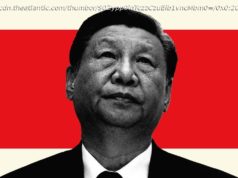Beijing will let American companies offer certain financial services, and agrees to buy energy, while Washington will accept cooked poultry imports
China and the United States have reached a comprehensive trade deal well within their 100-day deadline, with Beijing promising to open some financial services to US players, to buy US gas and to end restrictions on beef imports. The deal, which comes just five weeks after US President Donald Trump and his Chinese counterpart Xi Jinping agreed to address a US$350 billion trade imbalance within 100 days of their summit last month, is expected to lubricate ties between the two economies ahead of a planned China visit by Trump this year. While the 10-point agreement is mainly about China’s promises to open its market wider to US firms and buy more of their products, Washington has also promised to facilitate Chinese bank entrance into the US market and to allow sales of cooked poultry products. Also, a delegation led by a top White House adviser will attend the “Belt and Road Initiative” summit in Beijing on Sunday, offering a sign of endorsement for Xi’s ambitious bid to extend China’s global influence. Huang Rihan, a researcher at the Centre for China and Globalisation in Beijing, said the agreement put an end to worries about a “trade war” between China and the US. “There were worries that Sino-US relations would worsen, and there were concerns that a lot of trade disputes would arise after Trump won the election, but now people can see that China and the US are not trade enemies – the two countries can work together, ” Huang said. The idea of the US attending the belt and road summit came from the American side, finance vice-minister Zhu Guangyao said. “China and the US should cooperate in bilateral economic areas, but also step up policy coordination in the economy in a wider range of the world. I have participated in the negotiations for the initial results, and the 10th point [US attendance] was raised by the US, and China welcomes that, ” Zhu said. US Commerce Secretary Wilbur Ross hailed the agreement as “a Herculean accomplishment” forged in record time. “This is more than has been done in the whole history of US-China relations on trade, ” Ross said on Thursday. “Normally, trade deals are denominated in multiple years, not tens of days.” The US financial industry is a major beneficiary of the agreement on market access. US credit rating services, electronic payment services and bond underwriting businesses are now allowed into the Chinese market. The US will also allow American companies to ship liquefied natural gas to China. Regular LNG exports from the US would supply China with a fuel that is in high demand because it burns cleaner than coal and oil, and is therefore becoming the fuel of choice for electricity generation, along with renewable sources. The LNG export market is currently dominated by Australia, Qatar and Malaysia. Under the agreement, China will accept beef from the US, effectively ending the 14-year ban on American beef that began with an outbreak of mad cow disease in the US in 2003. Reciprocally, the US will allow Chinese cooked chicken in the American market. “China has shown its sincerity by making compromises, and it showed that China is not just paying lip service [to addressing the bilateral trade imbalance] , ” said Yu Miaojie, the deputy head of the National School of Development at Peking University. While it is uncertain how the new agreements will narrow the trade gap, Beijing’s concessions have offered Trump some concrete results he can show to his domestic audience. “Trump is not interested in China going into the US market, but the US going into the China market, ” said Douglas Paal, vice-president for studies at the Carnegie Endowment for International Peace, a Washington think tank. “The 100-day talks are just a start, ” said Zhou Shijian, an international relations professor at Tsinghua University in Beijing. “China can buy more … clean energy from the US, and China can mean a lot of business for the US – just think about soybeans, cotton and aircraft.”






